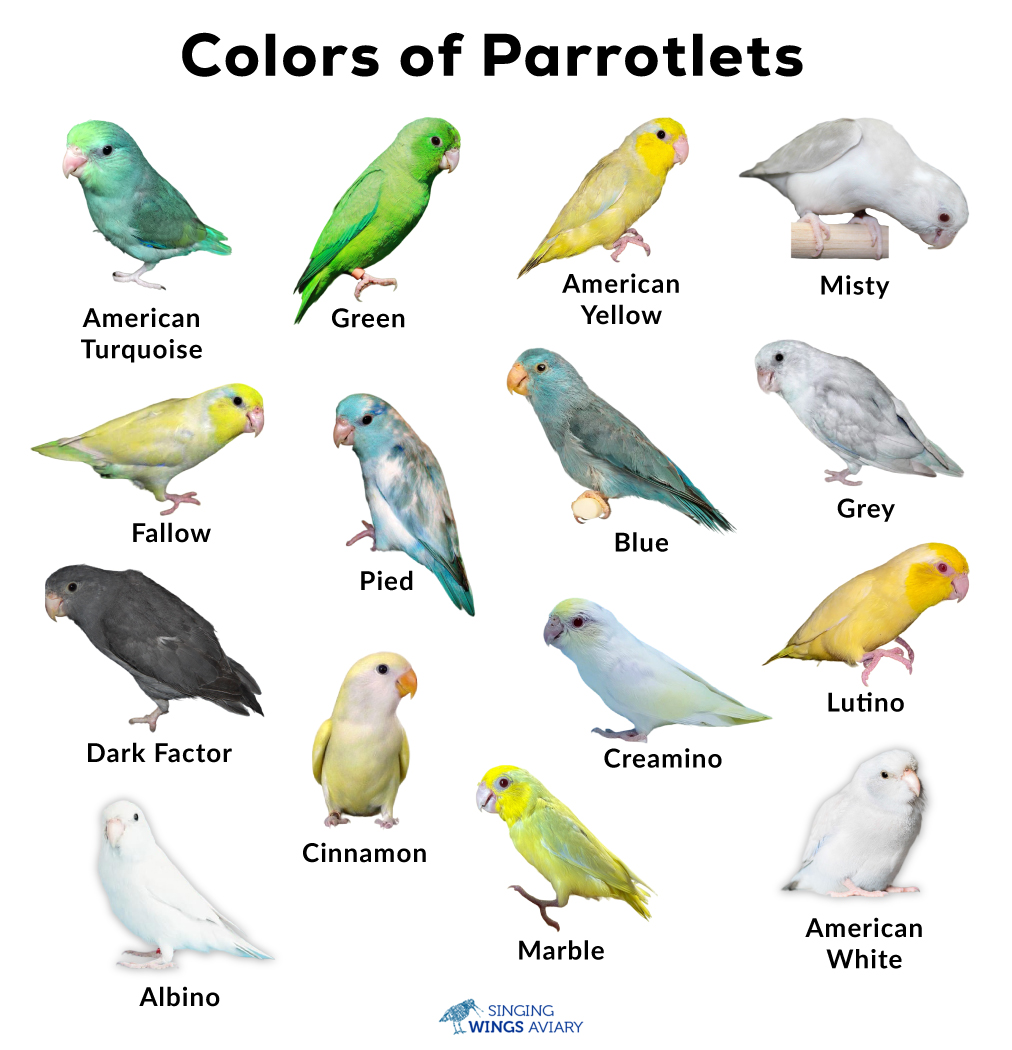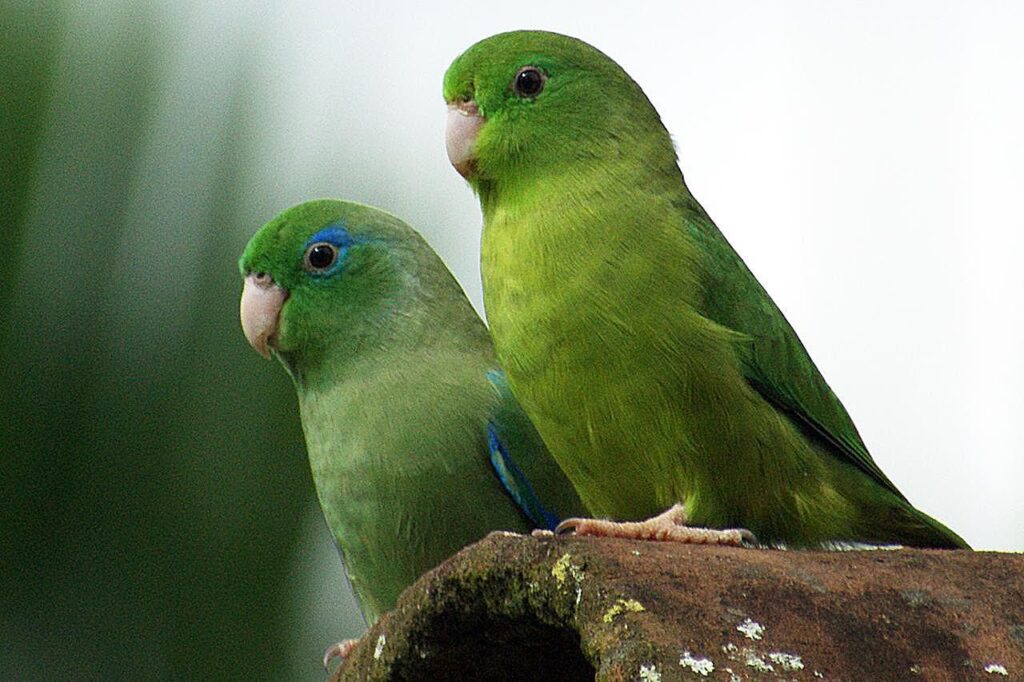Parrotlets typically live for 15 to 20 years. Proper care can extend their lifespan up to 30 years.
Table of Contents
Parrotlets, the diminutive cousins of the large Amazon parrots, offer a colorful blend of personality and longevity in a compact package. These pint-sized birds are becoming increasingly popular as pets, prized for their intelligence, playful nature, and the surprisingly long life that accompanies their small stature.
How Long Do Parrotlets Live? Engaging and affectionate, parrotlets have the endurance of larger parrots but require less space, making them ideal for those with limited room. Their longevity means a long-term commitment, so potential owners should consider the extended time frame for care. A well-balanced diet, regular veterinary check-ups, and a stimulating environment are crucial to ensuring that these vibrant little birds reach their maximum lifespan potential.
Lifespan Of Parrotlets
Parrotlets may be small in size but they boast a remarkably generous lifespan. Understanding how long these colorful birds live is crucial for any prospective or current parrotlet owner. The small size of these birds often leads people to underestimate their longevity. Yet, they are among the longer-living species in the avian world.
Average Years In Captivity
Captive parrotlets commonly enjoy extended lives due to their controlled environments. Beneath nurturing care, these birds often reach the upper limits of their lifespan potential. Here are some facts about their longevity:
- Typically, parrotlets live 15 to 20 years in captivity.
- Correct diet, excellent care, and engagement affect their longevity.
- On record, there are parrotlets that have surpassed 20 years.
Wild Vs. Domestic Longevity
Parrotlets in the wild face more challenges which can reduce their lifespan. Domestic birds, however, often outlive their wild counterparts.
| Environment | Average Lifespan |
|---|---|
| Wild | Up to 10 years |
| Domestic | 15 to 20 years |
Predation, food scarcity, and harsher living conditions take a toll on wild parrotlets. Domestic ones enjoy regular meals, protection, and veterinarian care. Such conditions significantly increase their average survival years.
:strip_icc()/Parrotletpersonality-3870923968_67b841f4b8_o-5b4d55b1c9e77c003eaaf42e.jpg)
Credit: www.thesprucepets.com
Factors Affecting Parrotlet Lifespan
Parrotlets are tiny bundles of joy with vibrant feathers and playful personalities. Owners treasure these pocket-sized parrots for their charm and companionship. But just like any pet, their lifespan is a key concern. With proper care, parrotlets can live for many years, but specific factors play a critical role in determining their overall longevity.
Genetic Predispositions
Genetics are the building blocks of life, influencing a parrotlet’s potential lifespan. Certain breeds might be prone to hereditary health conditions that can affect their longevity. For instance, some parrotlet families may pass down traits that make them more resilient, while others might inherit a susceptibility to disease.
Understanding genetic history is important for owners looking to ensure the well-being of their parrotlet.
Quality Of Care
- Diet: A balanced diet enriches a parrotlet’s life, boosting vitality and immunity.
- Environment: Safe, clean habitats free from stressors support longevity.
- Exercise: Daily activity promotes cardiovascular health, aiding in a longer life.
- Social Interaction: Parrotlets thrive with regular, loving interaction which can reduce stress and related health issues.
- Veterinary Care: Regular check-ups catch and treat potential health problems early.
Each aspect of care is a piece of the puzzle in a parrotlet’s lifespan. Owners committed to providing these fundamentals can positively influence their parrotlet’s years.
Optimizing Parrotlet Health
Parrotlets are tiny parrots with huge personalities and, with the right care, a substantial lifespan. Understanding how to optimize parrotlet health is key for these vibrant birds to live a full, happy life. Proper nutrition, regular exercise, and plenty of mental stimulation are essential parts of a healthy parrotlet lifestyle.
Proper Nutrition
A balanced diet ensures your parrotlet stays healthy. Quality pellet food, fresh fruits, and vegetables are a must. Here’s a brief rundown:
- Pellets: Choose a high-quality formula tailored for small birds.
- Vegetables: Incorporate leafy greens and colorful veggies.
- Fruits: Offer variety, but in moderation due to high sugar content.
- Protein: Cooked eggs and legumes can add necessary protein.
- Fresh Water: Change daily to prevent bacterial growth.
Regular Exercise
Active play keeps parrotlets fit and wards off obesity. Flight time and toys are fantastic ways to get moving:
| Indoor Flight | Interactive Toys |
|---|---|
| Ensure a safe, bird-proof room for free flight sessions. | Rotate toys regularly to maintain interest and encourage movement. |
Mental Stimulation
Mental health is as crucial as physical health for parrotlets. Puzzles and games keep their minds sharp. Try these stimulating activities:
- Teach simple tricks or commands to boost mental engagement.
- Hide treats around their cage to encourage problem-solving.
- Offer toys that require manipulation to extract a reward.
Common Health Issues In Parrotlets
Parrotlets may be small, but they have big personalities and can live a long time with proper care. Like any pet, they face health challenges. Knowing common health issues helps owners keep these vibrant birds thriving.
Identifying Symptoms
Observant parrotlet owners can spot early signs of illness. These little birds may hide their discomfort. Prompt action upon noticing symptoms saves lives.
- Changes in behavior: less active, not talking or singing
- Feather problems: plucking, fluffing, or loss of color
- Respiratory signs: sneezing, nasal discharge, labored breathing
- Eating habits: loss of appetite, weight loss, change in droppings
Preventive Measures
Maintaining a healthy environment is essential. These steps keep parrotlets in top shape.
- Diet: Offer a balanced diet including seeds, fruits, and vegetables.
- Cleanliness: Regularly clean the cage, perches, and toys to prevent disease.
- Regular Vet Visits: Yearly check-ups detect issues early, before they worsen.
- Stress Reduction: A stable routine and quiet, secure space lower stress levels.
Good care significantly extends a parrotlet’s life, rewarding owners with years of companionship.
The Role Of Veterinary Care
Ensuring a parrotlet has a long, happy life involves much more than just love and attention. Veterinary care plays a crucial role in the longevity of these vibrant little birds. Regular visits to an avian vet can detect issues early on, manage any developing conditions, and provide the best advice for their care.
Routine Check-ups
Routine check-ups are foundational to parrotlet health. These often include:
- Physical examinations to check for any signs of illness or stress.
- Weight monitoring to ensure they maintain a healthy weight.
- Feather and skin assessments to detect external parasites or molting issues.
- A review of dietary habits for optimal nutrition.
Scheduling visits once or twice a year helps keep your feathered friend in top shape.
Managing Illnesses
Disease prevention and early detection are key to prolonging a parrotlet’s lifespan. When illnesses arise, prompt action and:
- Accurate diagnosis
- Effective treatment plans
- Follow-up care
ensure the best outcomes. A trusted vet is your partner in navigating these challenges and keeping your parrotlet healthy.
Creating A Safe Living Environment
Parrotlets boast a life span of up to 20 years, with their longevity deeply influenced by their living conditions. Securing a nurturing and hazard-free environment plays a pivotal role in ensuring these vibrant birds thrive and enjoy a full, healthy life.
It seems that you are looking for guidelines on how to write content for an article or webpage. Below is a summary of these guidelines:
1. Ensure your content is presented in a user-friendly format. Use bold for important phrases and sentences to draw attention.
2. If the text is lengthy, organize it into multiple paragraphs for better readability.
3. Include tables if they help represent information more clearly.
4. Write in a manner that is optimized for search engines (SEO). Your content should be unique, concise, and written in an active voice.
5. Avoid using unnecessary linking words and phrases that don’t add value to the content.
6. Do not include a concluding paragraph at the end. Instead, make sure every sentence throughout the content is purposeful and related to the main topic.
7. Eliminate fluff or filler content that does not contribute to the subject matter.
8. All sentences should be short, ideally not exceeding 15 words, and easily understandable by children as young as nine years old. This will ensure the content is accessible to a wide audience.
The Importance Of Social Interaction
When we talk about parrotlets, their lifespan shines light on an essential factor: social interaction. These vibrant tiny birds can live up to 20 years with the right care. Just like humans, social connections greatly affect their well-being and longevity. Let’s dive into what this means for parrotlet owners.
Bonding With Owners
For parrotlets, bonding with their owners is key to a fulfilling life. A strong bond can be the difference between a happy bird and a stressed one. This bond doesn’t just happen; it needs time and patience. Here are steps to bond with your feathery friend:
- Interact every day
- Speak softly and frequently
- Respect their space
- Offer treats during training
Remember, trust takes time. These steps encourage a strong, lasting relationship that boosts your parrotlet’s happiness and health.
Interacting With Other Birds
Parrotlets also benefit from interacting with other birds. They are naturally social creatures and enjoy the company of their kind. Here’s why mixing with other birds is beneficial:
| Activity | Benefit |
|---|---|
| Playing | Stimulates their mind |
| Grooming | Builds social bonds |
| Communicating | Reduces stress levels |
Pairing or grouping should be done carefully, with attention to the birds’ compatibility and individual personalities.

Credit: www.birdcagesnow.com
Preparing For The Full Lifespan
Parrotlets may be small, but their lifespans pack a punch. With proper care, these petite parrots can be part of your family for up to 20 years! Embracing the full journey requires commitment and an understanding of their unique needs as they age. Let’s explore how you can prepare for the long road ahead with your feathery friend.
Long-term Commitment
Bringing a parrotlet into your home is not a short-term decision. Think of it as inviting a new, long-term friend into your life. Their long lifespan demands dedication and a love for avian companionship that extends well beyond the initial excitement.
- Consistent care: Parrotlets need daily interaction and a stable environment.
- Financial planning: Consider future costs for vet care, food, and toys.
- Space allocation: Ensure they have room to play and exercise as they grow older.
Considerations For Aging Parrotlets
As your bird ages, its needs will change. Stay responsive to these shifts to maintain their quality of life.
- Regular vet visits: Older parrotlets benefit from more frequent check-ups.
- Diet adjustments: Senior birds might need specialized food for nutritional support.
- Gentle interaction: Respect their energy levels and provide soft handling.
Understanding your parrotlet’s life stages ensures you provide love and care for years to come.

Credit: www.singing-wings-aviary.com
Conclusion
Understanding the lifespan of parrotlets is essential for any prospective owner. These charming birds can thrive for up to 20 years with appropriate care, including a nutritious diet and regular veterinary check-ups. By investing time and love into their well-being, you ensure a long and joyful life for your feathered friend.
Embrace the journey of companionship with your parrotlet and cherish every moment of their vibrant existence.
Ryan Everhart is a passionate bird enthusiast and blogger, primarily writing on his website, Avian Whispers. His journey into the world of bird blogging began with a deep interest in parrots, a species that captivated his attention for their intelligence and social behavior. Over time, his content expanded to cover a broader range of bird species, offering insights into bird behavior, care, habitats, and conservation.
Ryan is dedicated to educating his audience, which includes both new bird owners and seasoned enthusiasts. His writing is filled with personal experiences, expert knowledge, and practical advice on bird care. Through Avian Whispers, he aims to foster a deeper appreciation for birds, emphasizing their role in nature and the joys of having them as pets.
Starting with articles focused on parrots, Ryan’s work now encompasses a diverse range of topics such as feeding, training, habitat enrichment, and bird health. His love for birds extends beyond parrots, diving into various avian species. His informative and heartfelt writing reflects his commitment to the well-being of birds and the desire to help others connect with these creatures.
As a growing voice in the bird blogging community, Ryan strives to provide a platform where bird lovers can learn, share experiences, and connect over a shared passion for avian life. His blogs are not only educational but also serve as a reminder of the importance of protecting and nurturing the bond between humans and birds.




